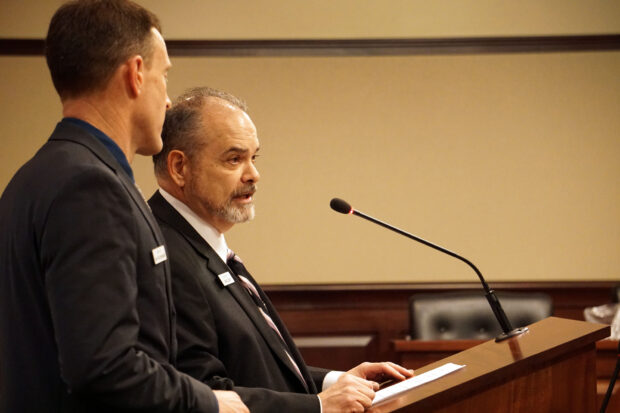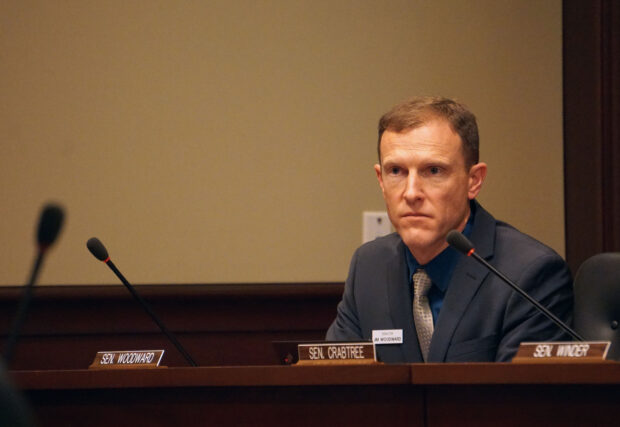
Working quickly, legislators placed a pared-down funding formula bill on a fast track, moving it through committee and passing it on the Senate floor Wednesday.
Compared to the overall funding formula debate, marked by more than two months of disagreement and setback, the newer bill moved at light speed.
The bill’s journey began at 8 a.m. in the Senate Education Committee, where it passed following a short public hearing.
From there, it was expedited to the Senate floor. By 3:30 p.m., it had cleared the Senate on the strength of a unanimous vote of approval.
House Bill 293 won’t rewrite Idaho’s school funding formula or change how the state pays for education — that proposal is dead for the year. Instead, this bill attempts to standardize definitions and requires school officials to submit new financial and enrollment reports to the state.
Sponsoring Sens. Dave Lent, R-Idaho Falls, and Jim Woodward, R-Sagle, said the definitions and data will help legislators next year when they return to attempt a full-blown funding formula overhaul. They said one obstacle to rewriting the formula this year was a lack of valid data dealing with enrollment and confusion over how to define economically disadvantaged students, at-risk students and more.

“With all the conversations this year, we know enrollment data was one of the big stalling points,” Woodward said.
As they did last week when the bill was introduced, officials from the Caldwell School District and the major education organizations expressed some concerns with definitions and some reporting requirements in the bill.
April Burton, Caldwell’s business manager, was particularly concerned about the ability to accurately define economically disadvantaged students. Before they enact a full-blown overhaul, Burton said, legislators should change their definition of economically disadvantaged students “so we can capture the demographics in our state and the school district in Caldwell.”
Leaders of the Idaho School Boards Association and the Idaho Education Association told Senate Education they would seek assurances from the Legislature that the bill’s definition of a local teacher salary schedule would not conflict with the existing career ladder law. The groups worried conflicting laws would throw the annual bargaining negotiation sessions into chaos.
“It could cause a major disruption if both sides need to return to the drawing board,” IEA Director of Public Policy Matt Compton said.
Finally, several stakeholders expressed concern about the validity of financial data the bill requires. They said it would be difficult to separate out spending of state discretionary funds — dollars often lumped in with money from supplemental levies or other local sources.
Legislators maintain HB 293 does not change salary schedules, and is designed only to define terms. They also said they would rely on the state’s rulemaking process to clarify definitions.
Superintendent of Public Instruction Sherri Ybarra did not attend Wednesday morning’s committee hearing, even though she included it on her weekly schedule. Ybarra included possible education committee meetings on her schedule, released Monday morning, with the caveat that she would attend “as needed for SDE business.” (Ybarra blocked off the typical 3 p.m. meeting time for Senate Education’s meeting, but the committee instead met at 8 a.m.)
Two Ybarra deputies — Marilyn Whitney and Tim Hill — attended Wednesday’s hearing.
The school funding debate has loomed large in education circles all year. Over the previous three years, a legislative interim committee developed the basic elements of a proposal to replace Idaho’s 25-year-old attendance-based funding formula with an enrollment model where funding follows the students. Legislators and Legislative Services Office staffers wrote more than a dozen drafts of bills to change the formula, but none of them reached the House or Senate floor for a vote.
Several of those drafts were never introduced, and others failed amid concerns over process and transparency.
Although the pared-down bill won’t change the funding formula, Lent and Woodward said they don’t believe the process failed or that time was wasted.
“While this isn’t a touchdown, we are putting points on the board,” Lent said.
HB 293 heads next to Gov. Brad Little’s desk for final consideration. The House voted 67-2 to pass it Monday.
